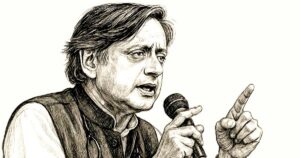Shashi Tharoor: The Voice of Moral Clarity We Needed
In choosing Tharoor to lead, India reminded the world, and perhaps itself, that its voice needed to be strong without being loud and proud without being hostile.

“It wasn’t just a speech, it was India speaking through the right voice, finally.” That one YouTube comment, under the ANI News video, captured what many like myself felt watching Shashi Tharoor address the Indian diaspora in New York on Memorial Day weekend. Standing before the crowd just hours after visiting the 9/11 Memorial, Tharoor, leading an all-party delegation, spoke with a moral clarity that was both grounding and uplifting.
Moral clarity is the rare ability to name evil without hate and assert strength without losing one’s sense of humanity. Just weeks after a ruthless terrorist attack designed to divide, that’s exactly what Tharoor offered: a strong assertion of justice without vengeance.
Nationalism Without Hatred
Tharoor delivered this message while seated beside Tejasvi Surya, a young MP who represents the loud, divisive politics of Hindu Nationalism. The contrast could not have been more stark. Tharoor embodies an older, inclusive idea of India; plural, thoughtful, and globally aware. Surya, the symbol of the new, reactionary strain that too often equates nationalism with hostility. In choosing Tharoor to lead, India reminded the world, and perhaps itself, that its voice needed to be strong without being loud and proud without being hostile.
Lines That Weren’t Crossed
Speaking without a script, Tharoor recalled not just timelines and diplomatic maneuvers, but human stories with striking detail. “One of the victims... was a Kashmiri Muslim pony operator who attempted not just to save the lives of his customers but to snatch the Kalashnikov from one of the killers - and it was turned against him,” he said. It was more than a briefing, it was a message delivered with quiet strength and clear purpose.
In recounting the killings, Tharoor returned often to the idea that the attack had failed in one of its core objectives: to spark communal violence. “I’m made proud as an Indian to say... that did not happen,” he said, noting how ordinary citizens, including Kashmiri Muslims, showed solidarity with the victims.
Aspiration in The Face of Imperfection
It was a powerful narrative - and largely true at the level of national politics and public messaging. But the full picture is more complicated. While India did not descend into widespread disorder, reports of targeted backlash, especially against Kashmiri Muslims in some parts of the country, remind us that communal resilience remains a work in progress.
What Tharoor offered was not a denial of this tension, but a diplomatic assertion of the India we aspire to be - and sometimes, in critical moments, manage to be.
A Voice That Transcends Politics
On YouTube, people across party lines and nationalities called Tharoor “the perfect example of an Opposition Leader,” a “master communicator,” and “an asset India has failed to fully use.” Some marvelled at how he spoke “without notes, with clarity and conviction,” while others noted that “every sentence hit the right chord.” A Nepali commenter expressed pride in seeing Tharoor represent shared regional grief. Even habitual critics of the Congress Party paused to say, “I don’t support Congress, but I support this man.” Many were struck by the absence of theatrics - just calm authority, strengthened by historical memory and moral force.
Perhaps the most striking aspect of the moment was that Dr. Tharoor, not a member of the ruling government, was chosen to represent India on a global stage. That a figure with such global stature and diplomatic experience was entrusted to convey the nation's position speaks volumes, not just about Tharoor’s individual credibility, but about what’s still possible within India’s democratic architecture.
A Compass in the Fog
In a moment clouded by grief, confusion, and political noise, Shashi Tharoor offered something that has become rare in our public life: moral clarity. Not the kind that shouts over disagreement, but the kind that listens, speaks firmly, and still leaves room for empathy.
If India is to navigate the challenges ahead, at home and abroad, it will need more such voices. Not just to defend the nation’s interest, but to define its moral compass.

